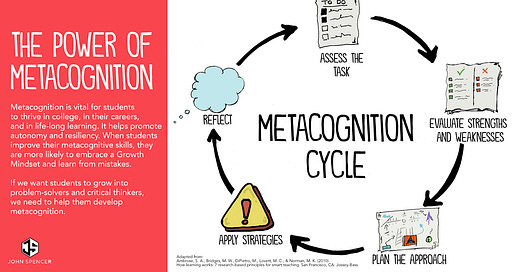TLC #036: How to Promote Metacognitive Skills through Reflection on the Learning Process
In this edition of the Learning Chronicle newsletter, we explore the step-by-step guide of how to promote metacognitive skills through reflection on the learning process.
Hi,
Here is your weekly dose of “The Learning Chronicle Newsletter," curated content that leverages the learning sciences, data, and evidence-based research to help K–12 educators, instructional designers, learning designers, course creators, training specialists, and learners enable, support, and optimize how learning happens while preparing learners for the future of work and solving real-world problems.
Welcome to all new subscribers! I amOmotayo Olorunfemi; a learning and development specialist. Check out the archive for previous editions using the first link above. Welcome!!! Once again.
One Learning Quote
"Enough courage to get started + enough sense to focus on something you’re naturally suited for + enough persistence to stay in the game long enough to catch a few lucky breaks + a lot of hard work. There’s your recipe."
- James Clear
One Article
Promoting Metacognitive Skills through Reflection on the Learning Process
Metacognitive skills - often called ‘thinking about thinking’, refer to the awareness and understanding of one's own learning process, including the ability to monitor, regulate, and evaluate learning.
Promoting metacognitive skills is essential for learners to become active, self-regulated learners who can monitor and evaluate their learning progress.
This learning template provides examples of effective strategies to encourage learners to reflect on their learning process and develop metacognitive skills.
Step 1: Introduce Metacognition
Begin by introducing the concept of metacognition and its importance in the learning process.
Examples of introducing metacognition include:
Define metacognition: Explain that metacognition refers to the awareness and understanding of one's own learning process, including the ability to monitor, regulate, and evaluate learning.
Provide examples: Offer examples of how metacognitive skills can be applied, such as:
setting learning goals
monitoring understanding
Self-explanation
Asking metacognitive questions like "What do I already know about this topic?" or "How does this relate to what I've learned before?"
Adapting study strategies and techniques
Self-assessment and reflection, and so on.
Step 2: Model Metacognitive Reflection
Model metacognitive reflection to demonstrate the process and encourage learners to follow suit.
Examples of modeling metacognitive reflection include:
Think aloud: Verbalize your own thought process while solving a problem or engaging in a learning activity, highlighting how you monitor your understanding and adjust your strategies.
Share personal experiences: Share your experiences of learning challenges, how you overcame them, and the strategies you used to reflect on and improve your learning.
Step 3: Promote Self-Reflection
Provide structured opportunities for learners to reflect on their learning process.
Examples of ways to promote self-reflection include:
Journaling: Encourage learners to maintain learning journals where they reflect on their learning experiences, including what they learned, challenges faced, and strategies employed.
Exit Tickets: Exit tickets are a valuable tool for reflection and assessment in the learning process. They are short, focused assessments that students complete at the end of a lesson or class period.
Use exit tickets as a form of reflection, asking learners to summarize their learning, identify areas of strength, and suggest areas for improvement.
Step 4: Ask Guiding Questions
Pose guiding questions to prompt learners' metacognitive reflection.
Examples of guiding questions include:
What strategies did you use to understand and remember the new content?
How did you monitor your understanding during the learning activity?
Did you encounter any challenges, and how did you overcome them?
Step 5: Encourage Goal Setting
Guide learners in setting realistic and achievable learning goals.
Examples of encouraging goal setting include:
SMART goals: Help learners set Specific, Measurable, Achievable, Relevant, and Time-bound goals to focus their efforts and monitor progress effectively.
Short-term and long-term goals: Encourage learners to set both short-term goals for immediate learning tasks and long-term goals for overall learning improvement.
Step 6: Foster Peer Discussions
Facilitate peer discussions to encourage learners to share their reflections and learn from each other.
Examples of fostering peer discussions include:
Small group discussions: Arrange small group activities where learners can discuss their learning experiences, challenges faced, and strategies employed.
Peer feedback: Encourage learners to provide constructive feedback to their peers on their metacognitive reflections, fostering a supportive and collaborative learning environment.
Step 7: Provide Metacognitive Strategies
Teach learners specific metacognitive strategies to monitor and regulate their learning.
Examples of metacognitive strategies include:
Self-questioning: Teach learners to ask themselves questions while learning to monitor their understanding and identify gaps in knowledge.
Self-assessment: Teach learners how to assess their own progress and understanding through self-checks and self-assessment tools.
Conclusion:
Promoting metacognitive skills through reflection on the learning process empowers learners to take control of their learning and become more effective learners. By introducing metacognition, modeling reflection, promoting self-reflection, asking guiding questions, encouraging goal setting, fostering peer discussions, and providing metacognitive strategies, educators can help learners develop essential metacognitive skills.
NOTE: Watch out for our next series of The Learning Sciences Guide, which will focus on developing metacognition and metacognitive skills. Don’t miss it.
One Video
This one-minute-plus video below, created by John Spencer on YouTube, aptly summarizes the concept of metacognition and metacognitive skills.
What is metacognition? (Exploring the Metacognition Cycle)
One Learning Question
What is not being said right now that needs to be said?
What problems could we avoid in the future, if only we had the courage to talk about them now?
What We Are Reading
Sahil Bloom on The Power of Thinking Differently
The Observatory on What is Complex Thinking?
AI in Education on AI in Education
That’s it for this week.
What would you want me to write about? Tell me in the comment
Ensure that you keep learning and subscribe to this newsletter by clicking the button below:



